Buying organic baby clothes is another important way to limit your child’s exposure to pesticides, metals, toxic dyes, and more. Here’s the ultimate guide to the best organic baby and toddler clothing brands!
Many of us are cautious about what we put on our baby’s sensitive skin from soaps and lotions to diapers and wipes. It seems only logical to choose natural, non-toxic products for a baby.
- Why is conventional baby clothing toxic?
- The 20+ Best Organic Clothing Brands for Babies and Toddlers
- How does conventional clothing affect your baby or toddler’s health?
- If you buy conventional clothing…
- How is organic clothing any different than conventionally made clothes?
- Trustworthy Organic Certifications
- Final Thoughts
But what about baby clothes? Should your child’s clothing also be organic?
It is, in fact, true that organic clothing for babies and children is important and can make a difference in the health of your baby. As more research has been done about conventional clothing, specifically all the chemicals, pesticides, and dyes they are doused in, the facts point to the suggestion that dressing babies, toddlers, and young children in organic clothing might be just as important as using organic shampoo or finding an organic crib mattress.
It all comes down to decreasing exposure to harmful toxins in everyday products.
It makes sense, right? We try to limit the use of harmful chemicals in our homes and especially anything that comes in close contact with our babies. Well, clothing is just about as consistent and as close to your baby as possible! It’s easy to recognize that people have been wearing conventional clothing for as long as forever, and there haven’t been any obvious side effects, but we must remember that as more research is done (look at the ban on PBDE flame retardants), and our farming practices are different to accommodate low cost and mass quantity (hello, pesticides!), more and more people are opting to fill their wardrobe with organic clothing.
And the demand for organic baby clothing means it’s becoming easier to shop for and even more affordable!
Why is conventional baby clothing toxic?
We can certainly try to limit our use of conventional baby clothing. Let’s take a quick look at how clothing is made and why this might affect the health of the most vulnerable: our babies.
There are few government regulations. Surprisingly, there are few regulations in children’s clothing. While the Consumer Product Safety Improvement Act states that all clothing be tested for phthalates and lead, there are many others that go untested and are present in children’s clothing.
Here is a small list of the chemicals found in children and baby’s clothing:
- Insecticides
- flame retardants
- Bleach
- Bromines
- Formaldehyde
- Petroleum byproducts
- silicone waxes
- ammonia
- PVC
- VOCs
- Sulfuric acid
- Polyvinyl alcohol
- Chlorine
- Sodium hydroxide
- Urea-formaldehyde
- Phthalates
- PFCs
- Dimethylformamide (DMF)
- Nonylphenol ethoxylates (NPEs)
- Nonylphenols (NPs)
- Fluorochemicals
Cotton is incredibly high in pesticides. Cotton is one of the most popular fibers we use. Unfortunately, cotton uses more pesticides than any other crop! The facts are truly significant: “insecticides account for almost 60% of all agro-chemicals applied to cotton worldwide.” This means that insecticides–the chemicals that work via neurotoxicity– are rampant in cotton fibers. So prevalent in fact that farmers and the like view cotton as the most chemical-laden agriculture product grown today. Yikes!
One fact that I find the most jarring is that pesticides routinely used on cotton are actually classified as hazardous by the World Health Organization. We knowingly saturate cotton crops used for clothing in hazardous pesticides; it’s pretty frightening, mind-blowing, even, and incredibly concerning to our health and the health of our littles!
The chemical processing. Once cotton is harvested, it undergoes even more chemical processing. I was actually very curious to know just how toxic conventional clothing might be. I guess I had some sense that all those great sales (baby clothing for $5?!) was a red flag and indicated that something in our clothing industry might not be all that healthy. And it’s true. The answer I found is yes, clothing made of non-organic materials can be pretty toxic.
Manufacturers use all kinds of bleaches, petroleum byproducts, oils, silicone waxes, ammonia, and formaldehyde-releasing agents to make that classic image of a white cotton sheet blowing in the wind, pure-as-can-be. From polyvinyl alcohol for easy weaving, chlorine for bleaching, sodium hydroxide for scouring, formaldehyde-fixing agents for more washing, urea-formaldehyde to reduce shrinking, and finally heating the garment (and locking in all those lovely chemicals).
And then there are the dyes. Most conventional cotton uses solvent-based inks containing heavy metals, benzene, and VOCs. The finishing is often laden with bromines, resins, formaldehyde, halogens. Hence, “wash before wearing” written on the tag. Definitely wash all clothing before wearing! However, note that, while washing clothing five times in hot water significantly reduces the level of chemicals on the clothing, they won’t be completely removed even after multiple runs through the washer. Some chemicals, like flame retardants, will never wash out.
And the finishing processes. Finishing is done after the fabric is colored and before it’s cut for production of the clothing itself. There should be no surprise that chemicals are involved: fluorochemicals are used for water repellency, resin-based products are used to inhibit wrinkles (that wrinkle-free shirt might seem less enticing now, right?) and fire retardants in sleepwear.
And synthetic clothing is even worse. Synthetic clothing is made of fabrics like polyester, rayon, acrylic, and spandex. And these fibers are loaded with chemicals. Polyester is a plastic and a petroleum byproduct. A study conducted by Greenpeace determined that there are a slew of chemicals in sportswear (which is typically made of all synthetic fibers). The results included phthalates, PFCs, Dimethylformamide (DMF), Nonylphenol ethoxylates (NPEs), and Nonylphenols (NPs).
What’s even more than wearing these fabrics is knowing the ecological ramifications. Think: microplastics. Every time you wash a synthetic fabric in your washing machine, minuscule pieces of plastic escape the filter and end up in our water. In addition, all synthetic fibers are non-biodegradable, unlike natural fibers. So, not only are we wearing these chemicals around, but we are likely breathing them in, drinking them, and eating them. I consider this a huge wake up call!
The 20+ Best Organic Clothing Brands for Babies and Toddlers
Now that I’ve lured you to the organic side of baby clothing, here is a list of brands that offer a variety of styles for your littles — from whimsical to earthy, you will find the perfect wardrobe without exposing your baby to potentially harmful chemicals and toxins.
Many of these organic baby clothing brands have the best certifications, including GOTS certification, Oeko-Tex, and others.
1) Burt’s Bees Baby
Burt’s Bees Baby offers organic cotton baby clothing (as well as bedding and towels) that are long-lasting and inexpensive. They have a great collection of pajamas, rompers, and onesies for babies. They also have a toddler collection of daily wear and outdoor clothing. I also really love their bedding. They have some great patterns and prints! Check out their baby essentials as well like wearable blankets, burp cloths, and crib sheets.
- GOTS certified
- Made in India
- Sizes: baby, toddler, and kids. Note: they also have family pajamas (adult sizes, too!)
2) Lamaze
Lamaze baby clothing is cute and very affordable! They have a wide array of onesies, sleep n’ plays, dresses, and rompers. Most of their clothing has bold, bright patterns– all 100% organic cotton.
- GOTS certified, Standard 100 by Oeko-Tex.
- Made in India.
- Sizes: Baby.
3) Monica + Andy
One of the original names in organic baby clothes, Monica + Andy is makes soft, gorgeous, organic baby essentials. You really can’t go wrong with anything from their line. The quality of Monica + Andy’s clothing is unmatched.
- GOTS certified.
- Made in India.
- Size: Baby, toddler, and kids up to size 8.
4) Colored Organics
Colored Organics makes GOTS-certified organic baby clothing with the mission to give back to children in need. They partner with a variety of organizations and charities both domestic and international to help make better lives for children. They do not use child labor, and treat their workers respectfully and fairly, offering them safe work conditions and paying them above standard pay. They offer moderately priced baby and kids clothing through size 12. As you look through their collections, you will notice most of their clothing features beautifully simple, solid color pieces that look incredibly soft and durable. You can also feel good about purchasing these clothes because a percentage of every purchase is donated to helping a child in need.
- GOTS certified.
- Made in India.
- Sizes: Baby, toddler, and kids.
5) Pact Baby
Pact offers GOTS-certified organic cotton clothing for babies, toddlers, kids, and adults. As much of their mission is to provide organic clothing for families, it’s also to provide a healthy environment for cotton farmers and manufacturers. They are Fair Trade certified to ensure that each garment is made in a safe facility. Their baby and kids selection is somewhat limited: think basics– but they have some great prices (most everything is under $20) and basics are definitely a necessity for every kiddo! (Note: they also sell organic maternity clothes and bedding, too…!) I love Pact!
- GOTS certified, Fair Trade certified.
- Made in India. (Note, place of manufacture may vary, but 70% of their clothing is manufactured where they harvest cotton, in India)
- Sizes: baby, toddler, kids, adults.
6) H&M
H&M came out with their Conscious exclusive collection for baby, toddler, kids, and adults. They have a variety of organic and sustainable clothing from daily basics to more stylized occasion-specific pieces. H&M definitely inspires hope for larger, mainstream brands to change their manufacturing practices. Their goal is to use 100% recycled and sustainable materials by the year 2030, and their philosophy is to be transparent with the consumer in the process. Currently, they explain that they source three types of cotton: organic cotton, recycled cotton (from used garments and textiles or leftovers), and cotton from the Better Cotton Initiative.
When you shop with them in their Conscious collections, you can read about the materials used as well as how it was made and where it was made. Not all of their garments are fully 100% organic cotton; you will find elastic waistbands, for example.
- 100% organic cotton
- Made in Bangladesh and India.
- Sizes: baby, toddler, kids, and adult.
7) CastleWare Baby
CastleWare Baby specializes in organic cotton baby and children’s nightwear through size 6 made in the USA. They offer wearable sleeping bags for babies and toddlers that are made organic cotton fleece instead of your classic polyester, and wonderful footie pajamas and pajama sets made of organic cotton.
- GOTS certified.
- Made in the USA.
- Sizes: baby and toddler.
8) L’ovedbaby
L’ovedbaby has a few organic collections. They pride themselves on their 100% organic cotton baby clothing that is clean and simple-looking. Their organic cotton basics collection includes solid color onesies, sleepers, hats, gowns, and leggings. They also have a really nice muslin collection perfect for hot summer days!
- GOTS certified
- Made in India
- Sizes: baby, toddler, and kids. (Adult pajamas, too!)
9) Under the Nile
Under The Nile has always understood the importance of organic baby clothing; in fact, they were the very first baby clothing company in the US to be GOTS certified. Their high-quality baby clothes are manufactured in a sustainable and socially responsible way. All of their Fair Trade clothing is made in Egypt at a certified FLO-Cert facility. All workers are paid a living wage and work in a clean, humane environment. One interesting note about their manufacturing is that their cotton is actually grown in a self-sustaining farm; they don’t use any outside fertilizer. This farming practice is called Biodynamic farming. In addition to baby clothing, Under the Nile sells blankets, bath towels, and the sweetest little toys!
- GOTS certified, Gold Seal of Authentic Egyptian Cotton, FSC Certification (Forest Stewardship Council)
- Made in Egypt.
- Sizes: baby and toddler.
10) Finn + Emma
Finn + Emma offers a wide selection of fresh and contemporary baby and toddler clothing as well as toys and baby gear. All of their clothes are GOTS-certified organic cotton, and they carry out their fair trade mission to ensure safe work environments for farmers and manufacturers. While their clothing is on the more expensive side, you can be sure it will last for a long time– perfect for handing down from one baby to the next! Note, most of their clothing is a generously sized as well, so their clothing can be worn for longer by your fast-growing little ones!
- GOTS certified.
- Made in India.
- Sizes: baby and toddler.
11) Tenth & Pine
Tenth & Pine is known for their gender-neutral super cute and stylish baby and toddler tops. Made in the USA from premium GOTS-certified organic fabrics, the Tenth & Pine collection will definitely win you over. (Note: they also make a great baby shower gift!)
- GOTS certified.
- Made in the USA.
- Sizes: baby, toddler, and kids.
12) MakeMake Organics
MakeMake Organics is a growing favorite of mine. In addition to baby clothes, they make gorgeous crib sheets, baby blankets, and more.
- GOTS certified.
- Made in India.
- Size: Baby and toddler.
13) Nui Organics
Known for their merino wool wear as well as organic cotton clothing, Nui has a variety of GOTS-certified baby and children’s clothing and accessories. Many of their merino wool pieces have a bit of stretch to them and are perfect for your growing baby or child! One note on merino wool: most manufacturers use chlorine to treat wool, but Nui Organics avoids this toxin altogether by using plasma — a completely non-toxic and safe way to produce organic wool suited for clothing. As with most organic clothing brands, the environment, as well as worker safety, is important to this company and its consumers. All of their manufacturing and production methods promise a safe and healthy environment for the Earth, workers, and our little ones who wear the clothing.
- GOTS certified.
- Made in India.
- Size: baby, toddler, and kids.
14) Kate Quinn Organics
Kate Quinn Organics makes fresh and modern baby and child clothing as well as bedding. Their clothing collections have a great variety of subtle and earthy prints. Make sure to pay attention to the clothing collection’s fabric; some collections are made of organic cotton while others are made of non-organic bamboo (bamboo + 4% Lycra) or Modal (a synthetic fabric). I would personally stick to organic cotton. Kate Quinn Organics also has a great program called With Love From Africa where they help to provide jobs to women in Kenya.
- GOTS certified (cotton clothing only).
- Made in India.
- Sizes: baby, toddler, and kids. *Note clothing selections for sizes 7 and 8 are limited.
15) Hanna Andersson
Hanna Andersson is probably one of the more well-known organic baby and children’s clothing lines. You can find their clothing at their brick and mortar stores, on Amazon, as well as on their website. While full-price styles tend to be on the higher end, they have frequent sales. I can definitely speak to their quality — their clothing and pajamas are very durable and the colors do not fade after washing. You will be able to hand their clothing down to your other children. Most Hannas are certified Standard 100 by Oeko-Tex, but not all of their clothing is organic.
- Standard 100 by Oeko-Tex.
- Made in China.
- Sizes: Baby, toddler, kids, and adult (pajamas).
16) Milkbarn
A company with style and heart, Milkbarn creates beautiful clothing and accessories for babies and toddlers. With an original style that can best be summed up as nostalgic, rustic, and millennial all in one, Milkbarn is definitely a brand to shop when you are looking for the best organic baby clothes. Owned by a mother-daughter team, all of Milkbarn’s organic textiles are GOTS-certified and use eco-friendly, low-impact dyes that do not contain any heavy metals.
- GOTS certified
- Made in USA.
- Size: baby and toddler.
17) Satva
Satva’s mission is to create a healthy work environment for farmers and manufacturers of textiles. This is the place to go if you want to find organic activewear for babies, toddlers, and women! They have some great sweatpants, t-shirts, leggings, and shorts for babies and toddlers. All of their clothing is made of GOTS-certified organic cotton. Note, some items have 5% Lycra (specifically for women’s activewear). Very reasonably priced as well!
- GOTS certified.
- Made in India.
- Sizes: baby, toddler, kid, and adult women.
18) Frugi
Frugi is a European brand that has really grown over the last decade into a comprehensive, well-respected, and quality source for GOTS certified organic baby and kid clothing. As part of their mission, they are a really hands-on company and work with their suppliers and provide safe manufacturing facilities for all employees. Their clothing is very cute: many bold patterns and colors! And you can take comfort in the materials your kiddos wear if you buy from Frugi. All organic cotton.
- GOTS certified
- Made in India, Sri Lanka, Turkey, China, and Portugal.
- Sizes: baby, toddler, kids, and adult.
19) Living Crafts
Living Crafts is a German company that offers a wonderful selection of baby, toddler, and kid clothing– all of their collections use vegan, organic textiles made in fair, safe conditions, so you can be confident in your investment. Their clothing is mostly the basic tees, pants, and pajamas that range from soft, subtle colors to bolder patterns.
- GOTS certified.
- Made in Europe.
- Sizes: baby, toddler, kids, and adult.
20) Piccalilly
Piccalilly sources their organic cotton from a fair-trade cotton program called Chetna Organic, which essentially helps farms in India find sustainable ways to produce their crops. The Chetna Organic program also ensures that every step of the manufacturing process is audited and continuously tracked to be sure the process is completely toxin-free, as-is the final product! Piccalilly clothing has so many fun, distinct patterns! They also have a good selection of muslin blankets, burp cloths, and swaddles, and bibs.
- GOTS certified.
- Made in India.
- Sizes: baby, toddler, and kids.
21) DorDor & GorGor
Headquartered in California, DorDor & GorGor offers GOTS-certified organic cotton baby clothing. While their selection is a bit limited, their clothing is truly durable and long-lasting. Their basics are perfect for the new baby in your family, and every item comes with a full guarantee; if you’re unsatisfied in any way it can be returned, replaced or refunded for up to a year after purchase. They definitely stand behind their products, which should give you complete confidence in their brand.
- GOTS certified.
- Made in China.
- Sizes: Baby.
22) Moon and Back
If you want unique, handmade baby clothing, To the Moon and Back is a family-owned company based in Holland. The owner, Lotte, designs all of the clothing and tested for safety by the son, Sam. All of their clothing is GOTS certified and meets the criteria for the Standard 100 by Oeko-Tex.
- GOTS certified, Standard 100 by Oeko-Tex.
- Made in Holland.
- Size: Baby.
How does conventional clothing affect your baby or toddler’s health?
As if chemical-laden clothing against your babies skin isn’t enough information to consider avoiding all of those cheap colorful onesies, it’s still a good idea to understand how these chemicals impact their health (and ours!).
Babies have delicate skin. First of all, babies have delicate skin. We keep them out of the sun, avoid fragrance in lotions and soaps, and use soft clothing because even the slightest bit of rough texture can chafe and hurt their baby skin. Their skin barriers are naturally weaker at such a young age, so they are much more vulnerable to infection as well as chemical exposures.
Chemicals Link to Health Issues. The chemicals used in clothing has been proven to put people at greater risk for health issues. In one study, researchers tested benzothiazole (a chemical that can be released from textiles), and they found that it can penetrate the skin and systematically impact the body. They conclude that their research will possibly also apply to other chemical contaminants in textiles and increase the potential for health hazards.
In another study, Swedish scientists found thousands of chemicals used in textiles. The leading researcher says “exposure to these chemicals increases the risk of allergic dermatitis, but more severe health effect for humans as well as the environment could possibly be related to these chemicals. Some of them are suspected or proven carcinogens and some have aquatic toxicity.”
If you buy conventional clothing…
Here are some red flag labels that likely mean plenty o’ chemicals. At the very least, I suggest you avoid clothing that includes the following language on the tag:
- Moisture-wicking
- Antimicrobial
- Wrinkle-free
- Antibacterial
- Stain-resistant
- Nonflammable
How is organic clothing any different than conventionally made clothes?
Organic clothing is made more simply without the use of toxic chemicals and does not present the same health hazards to your baby or young child as conventional cotton does. Here is a look at the process of how organic cotton clothing is made; you will definitely notice the differences!
Clean Farming. Farmers use organic, non-GMO cotton seeds (no treatment on the seeds). Unlike conventional cotton farms, organic farms use mother nature’s way to control common crop issues. For example, instead of fertilizers, organic farms use crop rotation and composting. Instead of herbicides to kill off weeds, organic farms use physical removal. And instead of pesticides, organic farms make sure the soil is super healthy so that pests are killed off by other insects that don’t harm the growth of cotton. They also can use trap crops that lure the pests away from the cotton. Genius!
Clean Factories. Once the cotton is harvested, the manufacturing is a linear, clean process. In order to qualify as organic, every step is tracked to ensure that the final product follows all guidelines and certification rules. From ginning (where they remove the cotton seeds) to spinning into yarn, weaving into fabric, coloring and finishing into pretty fabric, and cutting/sewing into clothing– every step must meet specific guidelines and standards to keep an organic certification and name the final product as “organic.”
In fact, many production practices are remarkably natural. Manufacturers often use peroxide to whiten and water-based dyes for coloring and printing. All of this is done without synthetic chemicals, heavy metals, and toxic solvents.
- GOTS certified, Standard 100 by Oeko-Tex.
- Made in Turkey.
- Sizes: Baby, toddler, and kids.
Trustworthy Organic Certifications
In order for cotton to qualify as “organic,” the farming practices and manufacturing of the garments must meet certain requirements.
Global Organic Textile Standards (GOTS)
GOTS is the main manufacturing certificate that includes standards from farming to manufacturing. It ensures that at least 70% of the final product contains organic materials. Those organic materials are held to the specific standards to ensure that every step of the process meets toxicological and environmental guidelines. Note, the GOTS certification extends to all natural fibers.
Under the GOTS certification, there is a very long list of parameters. I won’t go into all of them here, but here are the key marks that I consider important for baby clothing.
- Organic fibers are separated from conventional fibers.
- All chemicals must meet requirements on toxicity and biodegradability.
- Prohibition of toxic heavy metals, formaldehyde, aromatic solvents, functional nanoparticles, GMOs, and their enzymes.
- No use of chlorine bleach (only oxygen-based bleaches allowed)
- No phthalates or PVC used in printing
- Packaging materials must not contain PVC.
- All materials (raw materials and final textile products) must meet the required limits for unwanted residues.
Standard 100 by Oeko-Tex
Oeko-Tex certification ensures that clothing won’t contain known harmful chemicals. What’s really nice about this certification is that they segment their standards according to textile type and function. For example, baby clothing: because babies are a sensitive group, and clothing is in direct contact with their skin, all baby clothing falls into product class I. In this class, they have the highest standards and more limitations.
What is great about this certification is that they test for harmful chemicals that are also not legally regulated. Oeko-Tex is certainly a helpful certification, but I consider it a few notches below GOTS. Oeko-Tex certifies synthetic fabrics such as polyester, so I wouldn’t solely rely on this certification, but it is useful to know that there are at least standards for garments with this certification.
Final Thoughts
While organic baby clothes might seem expensive or even just a trend, realize that organic clothing is important to limit your baby’s exposure to irritants and harmful chemicals. I hope this list of the best organic clothing brands for babies and toddlers was helpful for you to begin your shopping for cute and safe clothing for your little one(s)!

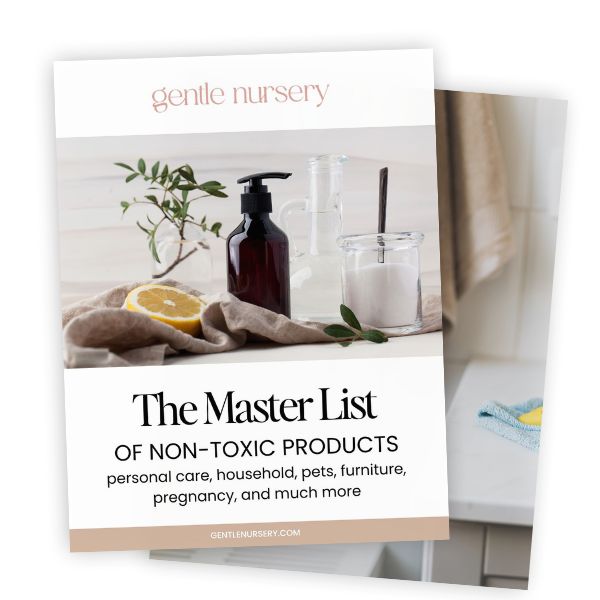
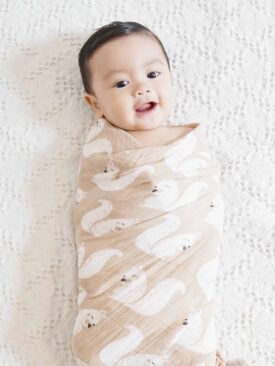
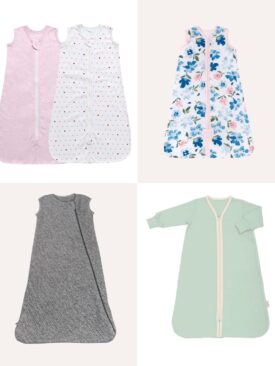
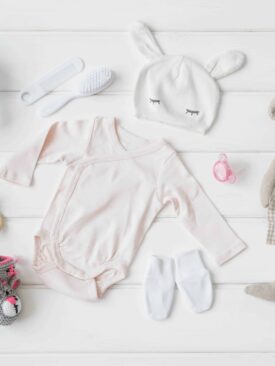
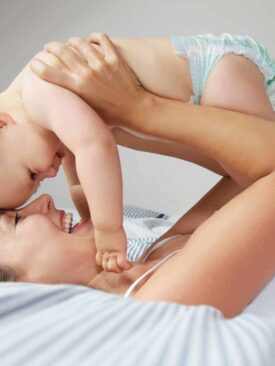
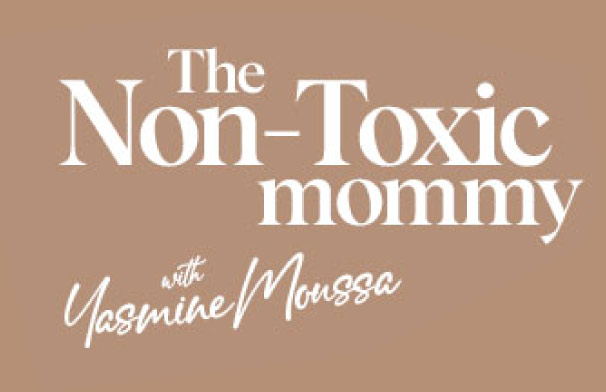
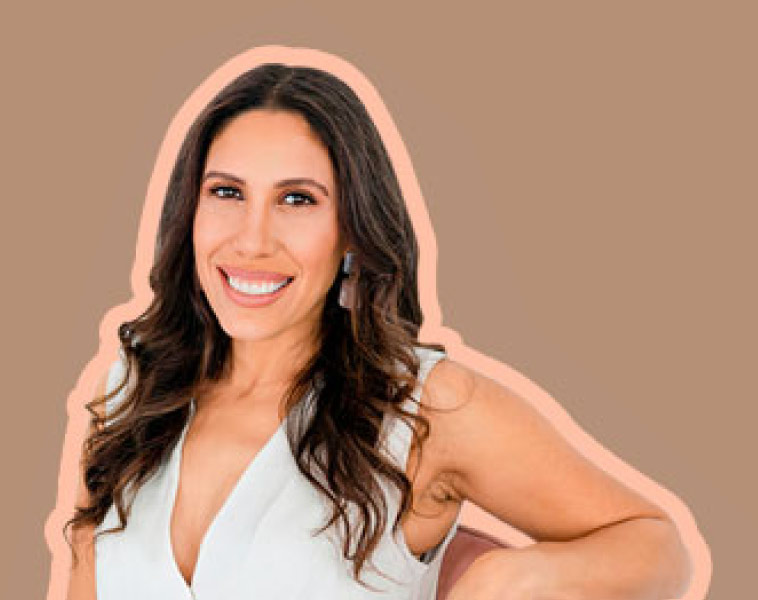


Leave a Reply